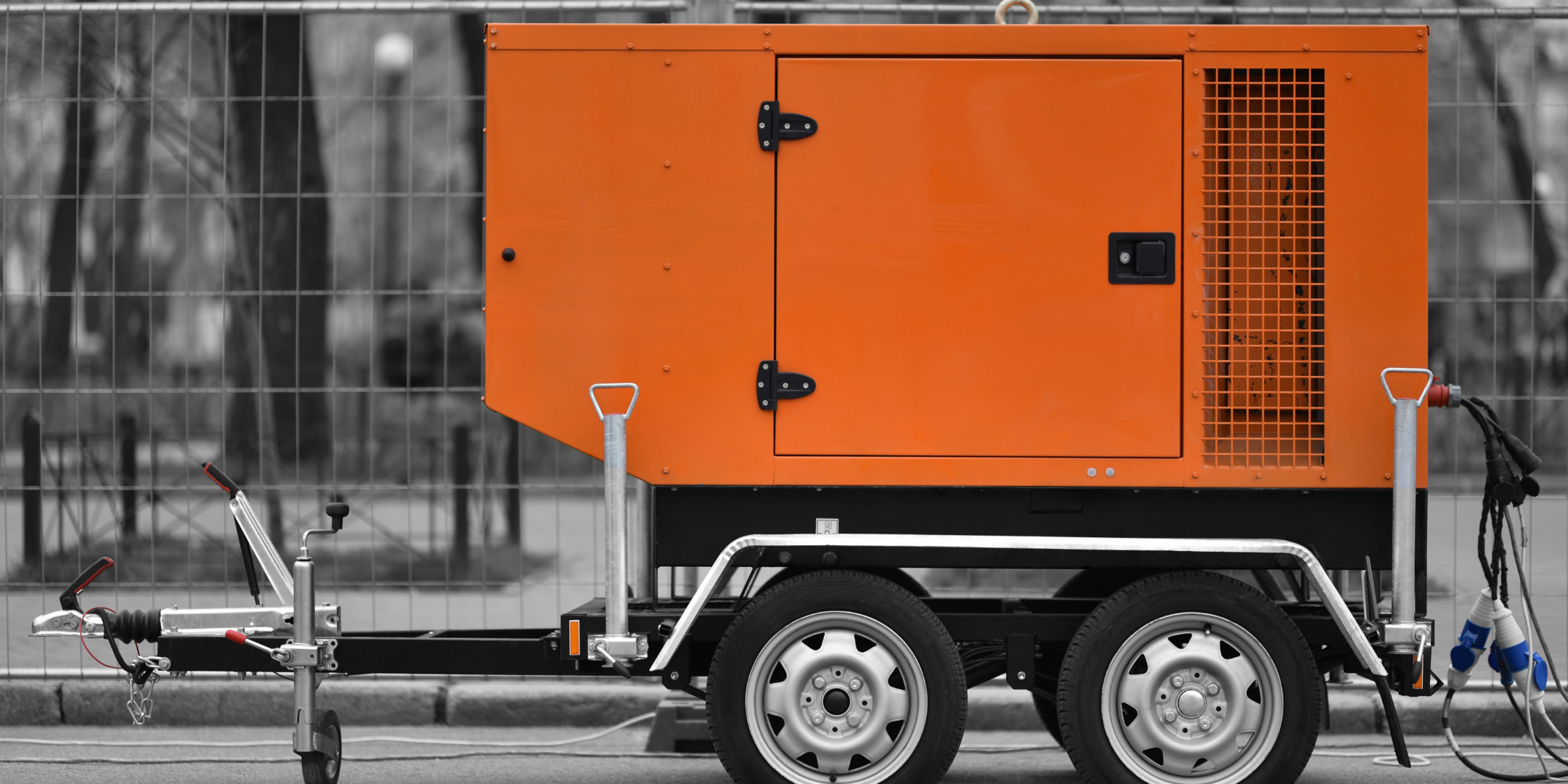The Pros and Cons of Natural Gas vs. Diesel Whole-House Generators
November 20th, 2024
6 min read
By Daphne Hunt

Power outages can leave you feeling unprepared, especially when essential systems like heating, cooling, or refrigeration suddenly stop working. Deciding between a natural gas or diesel whole-house generator can be overwhelming, but choosing the right one is crucial to keeping your home safe and comfortable.
or refrigeration suddenly stop working. Deciding between a natural gas or diesel whole-house generator can be overwhelming, but choosing the right one is crucial to keeping your home safe and comfortable.
With over 16 years of experience in HVAC and power solutions, we’ve helped homeowners like you find reliable, efficient backup power tailored to their needs.
By the end of this article, you’ll have the knowledge you need to confidently decide which generator is best for your home.
Why Does Fuel Type Matter?
The fuel type of your generator determines not only its performance and operating costs but also how convenient and environmentally friendly it is to use. Each type has unique characteristics that may make it a better fit for certain homes and circumstances.
Natural Gas Generators Pros and Cons
Natural gas generators are a popular choice for homeowners looking for a convenient and eco-friendly backup power solution. These generators run on natural gas supplied directly through your home’s utility line, offering significant advantages in terms of reliability and cost. However, they also come with some limitations that may not make them suitable for every situation.
backup power solution. These generators run on natural gas supplied directly through your home’s utility line, offering significant advantages in terms of reliability and cost. However, they also come with some limitations that may not make them suitable for every situation.
Pros of Natural Gas Generators
1. Continuous Fuel Supply
One of the most significant benefits of natural gas generators is their continuous fuel supply. Since they connect directly to your home’s natural gas line, you don’t have to worry about refueling, even during extended power outages. This makes natural gas generators highly convenient and eliminates the hassle of managing fuel storage.
Best for: Homes with reliable natural gas utility services, especially in urban or suburban areas where outages may last for days.
2. Low Maintenance
Natural gas burns cleaner than diesel, meaning it produces less residue and buildup in the generator’s engine. As a result, maintenance tasks like oil changes, filter replacements, and general cleanups are needed less frequently compared to diesel generators.
Best for: Homeowners who prefer a “set-it-and-forget-it” backup power solution that doesn’t require constant upkeep.
3. Lower Operating Costs
Natural gas is often more affordable than diesel, especially in regions where gas prices are regulated or subsidized. This cost-effectiveness makes it a practical option for long-term use, particularly in areas prone to frequent outages.
Best for: Budget-conscious homeowners looking to save on long-term generator operating expenses.
4. Environmentally Friendly
Natural gas is one of the cleanest-burning fossil fuels, emitting significantly fewer pollutants compared to diesel. This includes lower levels of carbon dioxide, nitrogen oxides, and particulates. For environmentally conscious homeowners, natural gas generators are a more sustainable choice.
Best for: Those looking to reduce their environmental impact without sacrificing reliability.
3 Cons of Natural Gas Generators
1. Dependence on Utility Supply
The biggest drawback of natural gas generators is their reliance on the natural gas grid. In the event of a widespread disaster, such as an earthquake or severe storm, gas lines may be disrupted or shut down for safety reasons, rendering the generator unusable.
Considerations: Homes in areas with frequent natural disasters may want to consider alternative fuel types for added reliability.
2. Higher Initial Setup Costs
Installing a natural gas generator often requires connecting it to your home’s existing gas line, which can be costly. If your home doesn’t already have a nearby gas connection, extending the line to accommodate the generator can significantly increase the installation expense.
be costly. If your home doesn’t already have a nearby gas connection, extending the line to accommodate the generator can significantly increase the installation expense.
Considerations: While the upfront costs may be high, the lower operating costs of natural gas can offset these expenses over time.
3. Less Portable
Because natural gas generators rely on a fixed utility connection, they lack the portability of diesel generators. This means they can’t be easily relocated or used in different locations, which could be a limitation for some homeowners.
Considerations: This isn’t typically an issue for whole-house generators, but if flexibility is a priority, diesel might be a better option.
Pros and Cons of Diesel Generators
Diesel generators are celebrated for their power and efficiency, making them a solid choice for those with high energy demands or in areas where utility reliability is a concern. However, they also come with challenges. Here’s a deeper dive into their advantages and drawbacks:
high energy demands or in areas where utility reliability is a concern. However, they also come with challenges. Here’s a deeper dive into their advantages and drawbacks:
4 Pros of Diesel Generators
1. High Efficiency
Diesel fuel has a higher energy density than natural gas, which means a single gallon of diesel can generate more power. This makes diesel generators especially cost-effective for long-term or high-demand use, as they require less fuel to operate for extended periods. For example, a diesel generator powering a large home or commercial space can run longer on a single tank compared to other fuel types.
Best for: Homeowners with high energy demands or frequent outages who want a cost-effective fuel option for long-term use.
2. Reliability
Diesel engines are designed to handle heavy-duty tasks and are known for their durability. They excel in demanding environments, such as powering large homes, multiple HVAC systems, or essential medical equipment during prolonged outages. Their simple, robust design also reduces the likelihood of mechanical failure, even under intense workloads.
Best for: Large homes, businesses, or critical applications like medical equipment that require dependable power during extended outages.
3. Independence from Utilities
Unlike natural gas generators that depend on utility lines, diesel generators offer complete independence. This makes them a smart choice in areas prone to natural disasters or infrastructure disruptions, where access to utilities might be compromised. You can store diesel fuel on-site, ensuring you’re prepared even during widespread outages.
Best for: Homes in disaster-prone or remote areas where utility disruptions are common, ensuring power is always available.
4. Wide Availability
Diesel fuel is widely accessible and can often be found even during emergencies, when other fuel sources might be harder to obtain. Additionally, on-site fuel storage means you don’t need to rely on supply chains during critical times, giving you peace of mind when it matters most.
Best for: Homeowners in areas where other fuel sources may be difficult to access during emergencies.
4 Cons of Diesel Generators
1. Higher Emissions
Diesel generators produce more greenhouse gases and particulates compared to cleaner-burning fuels like natural gas. While advancements in diesel technology, such as ultra-low-sulfur diesel and particulate filters, have helped reduce emissions, diesel still has a larger environmental footprint. This might be a concern for eco-conscious homeowners.
Considerations: Not ideal for eco-conscious homeowners looking to minimize their carbon footprint.
2. Noisy Operation
Diesel engines are typically louder than their natural gas counterparts. In residential areas or neighborhoods with noise ordinances, this could be an issue. While modern diesel generators have improved noise-reduction features, they’re still generally noisier than other types, which might be a factor if quiet operation is important to you.
Considerations: May be disruptive in residential areas with noise restrictions or close neighbors.
3. Regular Maintenance Required
Diesel engines, while durable, produce more soot and residue compared to natural gas. This means you’ll need to perform routine maintenance, including oil changes, air filter replacements, and fuel system cleanings. Neglecting this upkeep can lead to engine wear or reduced efficiency over time.
Considerations: Neglecting maintenance can lead to higher repair costs and reduced efficiency.
4. Fuel Storage Challenges
While having on-site diesel storage is convenient, it comes with its own challenges. Diesel fuel has a shelf life of between 6 - 12 months, and can degrade if not stored properly. Adding stabilizers can extend its usability, but improperly stored fuel can lead to clogs or damage in your generator. Additionally, you’ll need to ensure your storage tanks are secure, properly ventilated, and compliant with local safety regulations.
Considerations: Requires proactive management to prevent fuel degradation and ensure safety compliance.
Who Should Choose a Natural Gas Generator?
Natural gas generators are ideal for homeowners with reliable access to a natural gas line and those looking for a low-maintenance, eco-friendly solution.
looking for a low-maintenance, eco-friendly solution.
They’re particularly well-suited for:
- Urban and Suburban Homes: Where gas utilities are dependable and outages are more likely to be grid-related rather than caused by major disasters.
- Eco-Conscious Homeowners: Who want a backup power solution with a smaller environmental footprint.
- Long-Term Users: Who need a generator for frequent or extended use and want to save on operating costs over time.
While natural gas generators offer many advantages, their reliance on utility supply means they may not be the best fit for homes in disaster-prone areas or locations without natural gas access. Careful consideration of your home’s needs and location is key to making the right choice.
Who Should Choose a Diesel Generator?
Diesel generators are a powerful and reliable choice for homeowners who need high-capacity backup power and value fuel independence.
They’re particularly well-suited for:
- Large Homes or High Energy Needs: Perfect for properties requiring significant power to run multiple HVAC units, heavy appliances, or specialized equipment.
- Rural or Remote Locations: Where access to natural gas lines is unavailable, and on-site fuel storage ensures preparedness.
- Disaster-Prone Areas: Ideal for regions where natural gas utilities may be disrupted during storms or other emergencies, as diesel generators operate independently of utility lines.
- Frequent or Extended Outages: Reliable for homes that experience prolonged power outages, thanks to their efficiency and long runtime per gallon.
While diesel generators excel in power and reliability, they require regular maintenance and proper fuel storage. Careful evaluation of your home’s energy needs, location, and ability to manage upkeep is essential when choosing diesel.
Deciding Between Natural Gas and Diesel Generators
When you first started reading, you may have felt unsure about the differences between natural gas and diesel generators or which option would best suit your home. Now, you should have a clearer understanding of how these two fuel types compare in terms of costs, environmental impact, efficiency, and convenience.
diesel generators or which option would best suit your home. Now, you should have a clearer understanding of how these two fuel types compare in terms of costs, environmental impact, efficiency, and convenience.
Choosing the right generator fuel type is crucial to ensuring reliable backup power tailored to your specific needs. Whether you prefer the continuous convenience of natural gas or the powerful reliability of diesel, you can now make a confident decision that aligns with your home’s requirements.
With over 16 years of experience in HVAC and home power solutions, our team is here to support you every step of the way, helping you choose the generator that’s perfect for your home and family.
Next, explore your options further: Check out our articles on What Size Whole-House Generator Do You Need? and How Much Does a Whole-House Generator Cost? to dive deeper into selecting the right solution for your home.
Daphne Hunt holds a bachelor's degree in English and Mass Communication and has a lifelong passion for writing. She thrives on using her skills to craft compelling pieces that inform, inspire, and connect with readers.
Topics:

